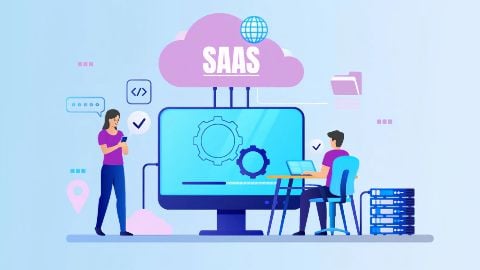
Choosing the Right B2B SaaS CRM Solution: A Strategic Guide
For B2B SaaS companies, customer relationships are the lifeblood of growth. A robust CRM (Customer Relationship Management) system streamlines sales pipelines, enhances customer retention, and drives data-driven decisions.

This guide cuts through the noise, outlining critical factors to evaluate and recommending solutions tailored for B2B SaaS success.
Why B2B SaaS Companies Need Specialized CRM Tools
B2B SaaS sales cycles are complex, often involving:
-
Long decision-making processes with multiple stakeholders.
-
Subscription-based models requiring recurring revenue management.
-
Integration needs with existing tools (e.g., marketing automation, ERP).
-
Scalability to support rapid growth and global expansion.
A purpose-built CRM addresses these challenges by centralizing customer data, automating workflows, and providing actionable insights.
Key Features to Prioritize in a B2B SaaS CRM
Pipeline Management:
Visual boards for tracking multi-stage deals.
Forecasting tools to predict MRR/ARR.
Customer Success Integration:
Health scoring to identify churn risks.
Automated renewal reminders and upsell triggers.
AI-Powered Insights:
Predictive lead scoring.
Sentiment analysis of customer interactions.
Integration Ecosystem:
Native connectors with tools like Slack, Zoom, HubSpot, or Stripe.
API flexibility for custom workflows.
Compliance & Security:
GDPR/CCPA compliance for global operations.
SOC 2 or ISO 27001 certifications.
Scalability:
Support for multi-currency, multi-language, and global teams.
Modular pricing to align with growth stages.
B2B SaaS CRM Solutions for 2025
Salesforce Sales Cloud
Best For: Enterprises needing deep customization and AI-driven analytics.
Standout Features:
-
Einstein AI for predictive forecasting.
-
CPQ (Configure-Price-Quote) tools for complex SaaS pricing tiers.
-
Advanced partner relationship management (PRM).
Considerations: High cost and steep learning curve for small teams.
2. HubSpot CRM
Best For: Startups and mid-market SaaS companies prioritizing ease of use.
Standout Features:
-
With essential sales, marketing, and service tools.
-
Seamless integration with HubSpot's ecosystem (CMS, Operations Hub).
-
Automated lead rotation and territory management.
Considerations: Limited customization for highly complex workflows.
3. Pipedrive
Best For: Sales-driven teams needing visual pipeline management.
Standout Features:
-
Intuitive drag-and-drop pipeline customization.
-
Revenue forecasting with AI accuracy.
-
Built-in email automation and call tracking.
Considerations: Light on customer success features compared to competitors.
4. Zoho CRM
Best For: Budget-conscious SaaS businesses seeking flexibility.
Standout Features:
-
AI assistant (Zia) for lead scoring and anomaly detection.
-
Blueprint workflow automation for standardized processes.
Considerations: Interface can feel cluttered for new users.
5. Close
Best For: High-velocity sales teams focused on outbound outreach.
Standout Features:
-
Built-in power dialer and email sequences.
-
Real-time sales activity analytics.
-
Unified inbox for calls, emails, and SMS.
Considerations: Limited marketing automation capabilities.
6. Microsoft Dynamics 365
Best For: Enterprises embedded in the Microsoft ecosystem.
Standout Features:
-
Tight integration with Teams, Power BI, and Azure.
-
Advanced AI for customer journey mapping.
-
Robust industry-specific templates (e.g., fintech, healthcare).
Considerations: Requires significant IT support for customization.
Implementation Checklist for B2B SaaS Teams
-
Audit Your Workflows: Identify gaps in lead management, onboarding, and retention.
-
Prioritize Integrations: Ensure compatibility with your tech stack (e.g., billing, analytics).
-
Test User Experience: Involve sales and CS teams in demos to assess ease of adoption.
-
Negotiate Scalable Pricing: Opt for per-user or revenue-based models to align with growth.
-
Leverage Support & Training: Choose vendors offering onboarding workshops and 24/7 support.
Future Trends in B2B SaaS CRM
-
Generative AI: Automating proposal drafting, meeting summaries, and personalized outreach.
-
Unified Customer Data Platforms (CDPs): Breaking silos between sales, marketing, and product usage data.
-
Vertical-Specific Solutions: Pre-built templates for niches like edtech, cybersecurity, or martech.
Final Recommendation
-
Startups: Begin with HubSpot CRM or Zoho CRM for affordability.
-
Scale-Ups: Adopt Pipedrive or Close to optimize sales velocity.
-
Enterprises: Invest in Salesforce or Microsoft Dynamics 365 for scalability and AI depth.
Pro Tip: 89% of B2B SaaS companies using AI-driven CRMs report improved win rates (Gartner, 2024). Choose a platform that evolves with your needs and embraces innovation.
By aligning your CRM strategy with these insights, you'll transform customer data into actionable growth—one deal at a time.
You May Like
The Power of CRM Software: Transforming Business Operations
In competitive business landscape, maintaining strong customer relationships is crucial for success. Customer Relationship Management (CRM) software has emerged as a powerful tool to help businesses streamline operations, enhance customer interactions, and drive growth.
Choosing the Right CRM Software: A Comprehensive Guide
Selecting the right Customer Relationship Management (CRM) software is a critical decision for any business. With numerous options available, it's essential to evaluate your needs, understand the features offered, and choose a solution that aligns with your goals.
How to Unlock the Full Potential of CRM Software for Business Success
Customer Relationship Management (CRM) is more than just a tool, it's a game-changer. When fully utilized, CRM software can transform how your business interacts with customers, streamlining processes, improving communication, and driving growth.
Customer Relationship Management Tools in 2025: The AI-Powered Revolution
Customer Relationship Management (CRM) tools have evolved from basic contact databases into AI-powered growth engines. By 2025, the market will drive higher retention and sales productivity through predictive analytics, omnichannel automation, and low-code customization – transforming how businesses win and retain customers.
ClickUp and the Future of Productivity: How Project Management Is Evolving in 2025
ClickUp is changing how teams manage projects and boost productivity. It brings tasks, goals, and collaboration together in one simple, powerful workspace.